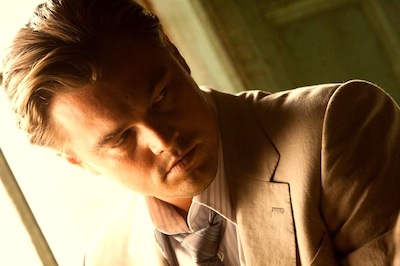By David Ross. I saw only a few Hollywood films this year. Among Oscar contenders, I caught The Social Network (a well-told tale within narrow parameters), Toy Story 3 (a film our great-grandkids will revere no less than we do), How to Train Your Dragon (Avatar without the brainless politics), and Inception (ludicrous spew of egomaniacal director).
What to say about Inception, a film so self-enamored that it twists itself into knots the better to quaff the fragrance of its own rear end? It’s just bad. Badly acted, badly directed, badly written.
Science fiction is supposed to trace the arc of human possibility and send us postcards from our own future, or at least from a conceivable future. Inception, like the Wachowski brothers’ Matrix and Steven Spielberg’s Minority Report, imagines a factitious technological development and spins a strictly arbitrary tale. There’s no reason to give a damn. Inception is not about the implications of our present reality but about itself. It’s fixated on the superficial dazzle of its own self-enwound idea. Dr. Apuzzo’s review in these pages appeared upside down (see here), but it might equally have appeared in mirrored reverse, to indicate the film’s narcissus gaze.

And then there is Leonardo DiCaprio, the baby-faced siren who lures directors to their artistic deaths. DiCaprio’s fatal attraction is one of the great mysteries. Do directors remember Titanic and see nine zeros where a performance is supposed to be? He’s lumbering, puffy, and nerveless, genetically closer to Keanu Reeves than to Al Pacino or Robert DeNiro. Christopher Nolan is taken in – okay, we expect as much; but Martin Scorsese four times? DiCaprio has laid waste a whole generation of potentially good films, starting with Danny Boyle’s The Beach. Brad Pitt has also ruined his share of films, but he has not gotten his mitts on nearly as many prestige projects.
Ellen Page is cute enough, and I enjoyed Juno as much as the next nerd who likes to see his own kind hold its own on screen, but no actress is less destined to be the next Sigourney Weaver. She jumps, she runs, she shoots, all the while conveying the sense that she’d much rather be reading Zadie Smith in some nice coffeehouse of the mind or maybe working on her grad school applications.

I did see one more Oscar nominee, come to think of it. Exit through the Gift Shop is a strange piece of work: a documentary about an aborted documentary about street art. It follows the director of the aborted documentary, Thierry Guetta, as he evolves from vintage clothing store owner, to illicit street-art videographer, to daredevil street artist called Mr. Brainwash, to celebrity artist in his own right, despite having no training or experience whatsoever. Guetta now sells his Warhol-style lithographs for large sums at the highest strata of the auction world. Complicating matters, there’s speculation – probably correct, if I had to guess – that Exit through the Gift Shop is an elaborate prank perpetrated by its director, the legendary street artist Banksy, and that Guetta is merely a Banksy frontman. The Times of London floats this theory here.
Whether documentary or mockumentary, Exit through the Gift Shop is, at the very least, a postmodern artifact to be reckoned with. It begins by celebrating the authenticity of street-art heroes like Shepard Fairey (creator of the red, white, and blue Obama icon) and Banksy himself; it morphs into a deconstruction of postmodern inauthenticity as the putatively talentless Guetta manufactures a vast body of work in no time and successfully sells himself as the latest phenom to emerge from the streets; it morphs again into a vindication of Banksy on the assumption that Guetta has become rich and famous selling art that is, after all, Banksy’s.
What to make of this? Exit‘s pretzel-logic is no less involved than Inception‘s, but we find ourselves implicated in it; its maze is our maze, and we have a vested interested in finding our way out. Something, for once, is at stake.
Posted on March 8th, 2011 at 10:04am.

I didn’t think Inception was anything special either. I really didn’t like the inclusion of DiCaprio, who I find almost as talentless as Natalie Portman. But I’m a big fan of both of the Batman films, and I have high hopes for the upcoming Superman re-reboot.
Mr. Ross:
First, I agree that Inception is, as you call it, an “Epic of Narcissim.” The film has way too much of hook, and is not “about” anything — basically it’s a heist film wrapped in a simple, yet confusing, concept. The film certainly isn’t helped by its layers of exposition, which is probably the biggest example of its narcissim.
If I reached to identify a theme in Inception, it would be the dangers of not understanding truth and reality, or blurring the lines of them. Like I said … that’s kind of a reach, but I can make it stick with some effort if I had to do so.
Through all of this, I still enjoyed the film — I’m not going to grab it from my a burning house, but I didn’t think my time was wasted.
Perhaps the headline of this piece misled me, but you seem to lack a thesis for this piece. It’s more or less your musings about a couple current films.
I was interested at “Badly acted, badly directed, badly written” but you hardly support this, except for your take on Page’s performance, with which I agree. I also agree with the screenplay’s issues, which I stated.
The part with which I completely disagree is your comparison of the film to The Matrix and Minority Report. Neither film is terribly original, but I do believe their true science-fiction — the stories revolve around the concepts, and they both examine consequences of the fsci-fi elements. Spielberg’s film is a little more traditional sci-fi (the political and personal effects aren’t very subtle), whereas The Matrix is more of a Joseph Campbell-ian tale (the importance of the individual over the collective, and the caution of AI).
I should clarify here, for everybody’s benefit: I provided the headline to David’s post.
Writing headlines for hodgepodge articles is not easy — at least for me at my paper. To make it easy on you, Mr. Ross could’ve found a common thread for the piece, made it his lead, and brushed up the transitions.
The narcissim of Inception is an interesting topic, because whether you liked it or not, the film has a healthy dose of if.
I don’t mean to be too critical — you know I love the site. It’s probably just the editor in me.
Well, I still like Inception, despite the fact everyone at this site hates it. I will readily acknowledge it is no masterpiece, though, and it could have been better. I think Nolan is great and will continue to do great things, but this film reveals as many of his flaws as it does his strengths.
As to DiCaprio–I sort of agree, I think he’s nowhere near the great ones he’s supposed to be replacing, but I think he has promise in certain places. While his performance in Gangs of New York was dire, and in The Aviator he tried to replace depth and subtlety with showiness, I think he really achieved a great performance in The Departed (an imperfect film, but still a good one, I think). In Shutter Island he was over the top again, though, and in this he was merely serviceable.
I disagree with the comment about Brad Pitt. I think he has emerged as a really talented actor who is finding more and more great projects to get into. Just looking at his projects over the last decade or so: Fight Club (where his performance, at least, is beyond question), The Assassination of Jesse James by the Coward Robert Ford, Burn After Reading, The Curious Case of Benjamin Button, Inglourious Basterds, and Terrence Malick’s upcoming Tree of Life (which, if it’s damaged by any actor, it’s likely to be Sean Penn).
No.
It got too confusing for me, I admit. But like the Matrix, it causes the actors to doubt their reality such that they think suicide is their escape to a more wonderful true life. Given that we ourselves might be dreaming at any time, as is so in our most real of dreams, who knows?
So, acting aside, I think it was pretty well written and I guess directed well.
You guys are too rational for these movies, I think. The Matrix? It’s Socrates with martial arts. As you read this, you don’t know if your a “battery” or not, both slave and and maybe entertainment for, I don’t know, Klingons, do you?
I hope for an answer and will check.
Klingon Ensign Vxksiwer, er uh, I mean me.